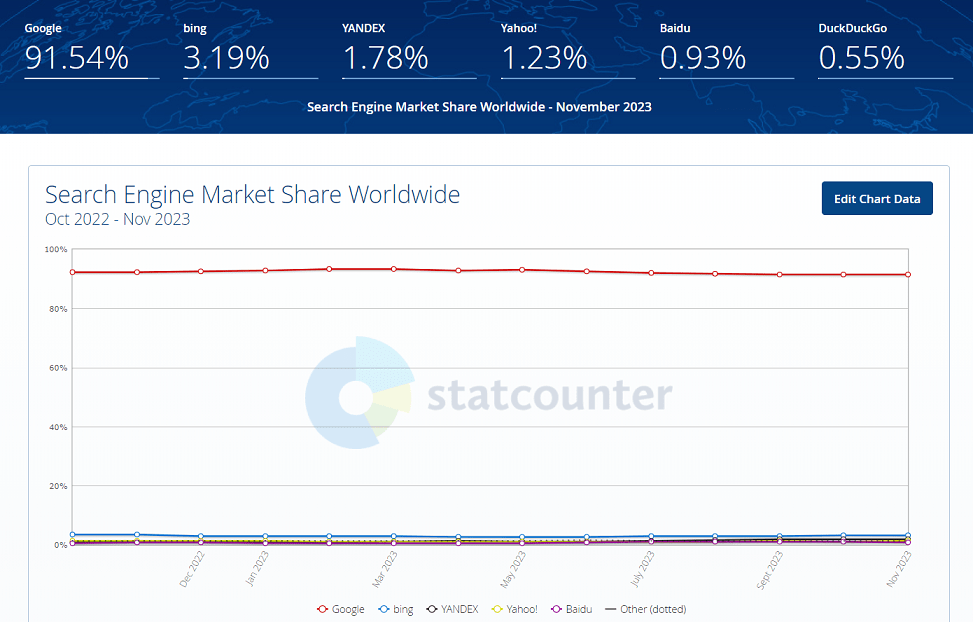Quick Answer
In this envisioned future, AI assistants and chatbots like ChatGPT will take over the role of conducting user searches. They will either completely bypass traditional search engines or act as intermediaries, effectively breaking the direct link that currently exists between users and search engines. This change could significantly alter how we interact with search technology.
This shift is also expected to transform SEO into AIO (Artificial Intelligence Optimization).
Should this transition not fully materialize, we can anticipate advancements like predictive searches tailored to user behavior, augmented reality (AR) for immersive information, enhanced voice search capabilities, and deeper integration with IoT from existing search engines. SEOs will need to adapt accordingly.
Search engines have changed a lot over time, especially because of improvements in artificial intelligence (AI).
In the past, search engines used to just look for keywords, but now they are much smarter and use AI to understand and find what we’re looking for. As we move forward, AI is going to become even more important in how search engines work.
This article talks about how search engines are right now, how AI is being used in them, and what searching on the internet might be like in the future.
AI Integration in Search Engines
Modern search engines like Google, which holds a dominant market share according to StatCounter, along with Bing and others, have significantly evolved from just matching keywords.

They have been using complex algorithms that consider the context of searches, user behavior, and the deeper meaning behind queries for a long time now.
AI, particularly machine learning and natural language processing (NLP), has been instrumental in this evolution.
Let’s look at some of the main ways AI is being used in search engines today:
- Understanding User Intent: AI algorithms can analyze the intent behind a query, distinguishing between informational, navigational, and transactional searches. This understanding allows for more accurate and targeted results.
- Semantic Search: Instead of focusing on exact keyword matches, AI enables semantic search, which understands the context and the relationship between words in a query. This leads to a more intuitive search experience.
- Personalization: AI tracks user preferences and search history to customize results. This personalization means that the search results can vary significantly from one person to another, based on their past interactions.
- Voice Search and Virtual Assistants: With the rise of virtual assistants like Siri, Alexa, and Google Assistant, voice search is becoming increasingly prevalent. AI is crucial in interpreting and processing natural language queries.
The Most Likely Scenario
We believe that as AI technology progresses, it will revolutionize and eventually render traditional search methods obsolete.
AI will take over the task of searching, delivering users meticulously filtered and ready-to-use information. This will reduce the need for users to sift through search results themselves.
Initially, AI may rely on existing search engines, but eventually, it could independently conduct searches without them.
Search engines as we know them are likely to transform into personal AI assistants or become less relevant. They might first lose direct user interaction, as AI steps in as an intermediary, and later be completely phased out of the search process.
Moreover, the concept of SEO (Search Engine Optimization) is expected to evolve into AIO (Artificial Intelligence Optimization).
What exactly is AIO?
In reality, it’s different.
We think AIO is about making content that AI systems like ChatGPT, increasingly used for searches, will choose to answer user questions (hopefully with a link back to your site).
This means AIO is about optimizing for AI chatbots and assistants, not about optimizing for traditional search engines.
These predictions highlight a future where AI plays a central role in how we access and process information.
The Evolution of Search in Case It’s Not Taken Over by AI Chatbots
As we look ahead, several exciting developments are on the horizon for the future of search engines in case it avoids being taken over by AI chatbots:
Predictive & Proactive Search
Future search engines may become more predictive, offering information based on anticipated needs. AI could analyze past behavior, time of day, location, and other factors to proactively present relevant information without a specific query.
This means that your search engine could suggest traffic updates, weather forecasts, or news articles even before you ask, based on your routine and preferences.
For example, if you regularly search for traffic updates every weekday around 7:30 AM, the search engine might start displaying these updates automatically at that time, or even earlier if there’s an unexpected roadblock or heavy traffic on your usual route.
Augmented Reality (AR) Integration
AR could be integrated into search, allowing users to overlay information onto the real world. Imagine pointing your phone at a restaurant and instantly seeing reviews, menu items, or even booking a table.
This integration would blend digital information with physical environments, enhancing the way we interact with the world around us.
Improved Voice & Conversational Search
Voice search and AI conversation, used in systems like Google Assistant, Siri, and Alexa, are common in today’s search engines.
They let users search easily using everyday language. As these technologies get better, we can expect even smarter and more helpful voice search features in the future.
Future improvements might include:
- Better Understanding of Context: Future voice search could become more adept at understanding the context of a query, taking into account previous interactions and the user’s current situation.
- More Natural Conversations: The interactions with AI assistants could become more conversational and less command-based, allowing for a more natural dialogue flow.
- Improved Accuracy: As AI models learn from a broader range of voices, accents, and speech patterns, the accuracy of voice recognition is likely to improve significantly.
- Complex Query Handling: Future advancements may enable voice search to handle more complex queries and provide more detailed responses, making it more akin to a human-like assistant.
Increased Privacy & Ethical Considerations
With AI’s growing role in search, privacy, and ethical concerns will become more prominent. Future search engines will need to balance personalization with privacy, possibly through new regulations and user-controlled privacy settings.
This shift would ensure that while search engines become more intelligent, they also respect user confidentiality and ethical standards.
Learn more ➡️ AI’s Role in Strengthening Online Privacy
Integration With IoT & Smart Environments
Search will extend beyond traditional devices, integrating with the Internet of Things (IoT). This integration could enable context-aware searches across different environments, like homes, cars, or public spaces.
Your smart home could suggest recipes based on what’s in your fridge, or your car could provide real-time traffic updates and alternative routes.
AI-Driven Content Creation & Curation
Right now, AI helps make basic content and better search results. In the future, it will be able to do much more, like creating detailed content that fits what each person likes.
This means SEO experts will need to focus on making content that’s not just easy to find but also really matches what each user wants.
They’ll also have to be careful about using AI the right way, to keep content useful and fair for everyone. As AI improves, the way we use it in SEO will have to change and become smarter too.
⚡ Check also ➡️ Evergreen Content in the Age of AI
Visual & Multimodal Search
Advances in image recognition and processing will enhance visual search capabilities. Users could search with images or a combination of text, voice, and images, leading to a more intuitive and rich search experience.
This means you could snap a picture of an item and find out where to buy it or use a combination of voice and images to get more precise search results.
Conclusion
The future of search engines, deeply intertwined with AI, promises a more intuitive, personalized, and efficient way to access information.
As AI continues to evolve, it will redefine our interaction with the digital world, making search an even more seamless and integrated part of our daily lives.
However, this future also brings challenges, particularly in privacy, ethics, and ensuring equitable access to technology. Embracing these challenges and opportunities will be key to shaping a future where search engines empower users more profoundly than ever before.

